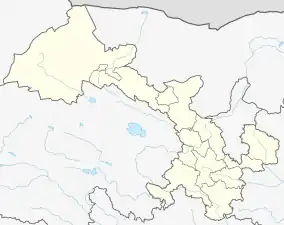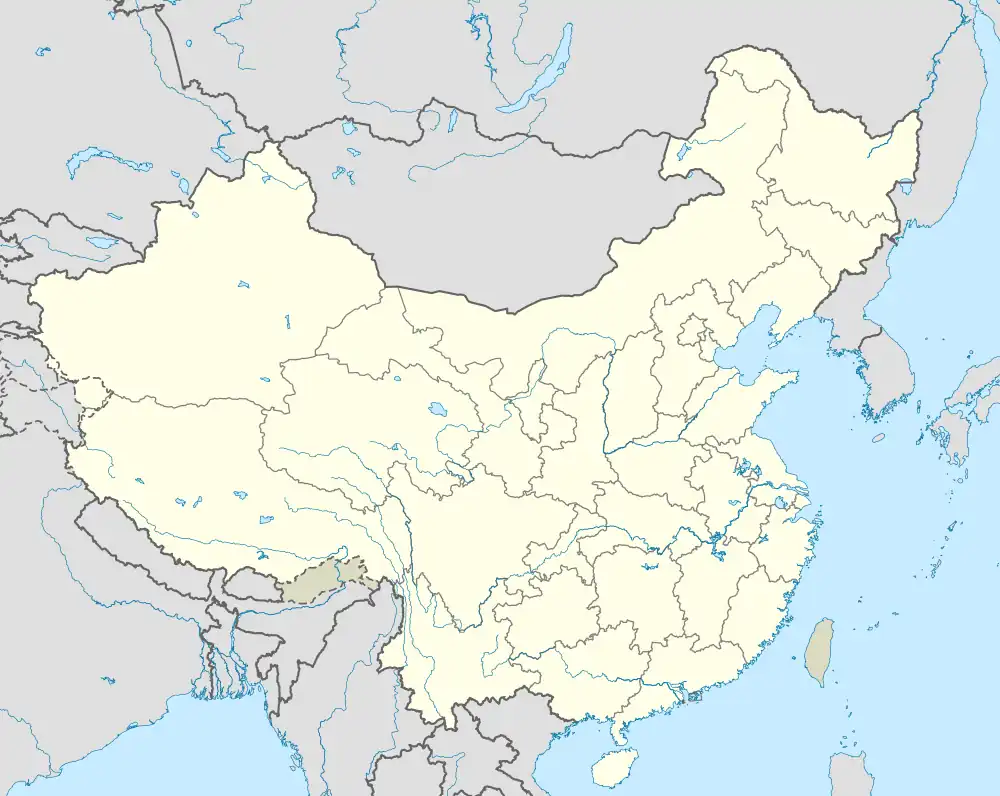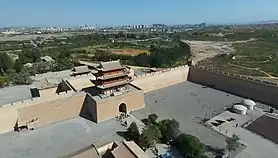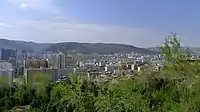Jiayuguan City
Jiayuguan (simplified Chinese: 嘉峪关市; traditional Chinese: 嘉峪關市; pinyin: Jiāyùguān Shì ⓘ) is a prefecture-level city in northwestern Gansu province, with a population of 312,663 as of the 2020 census. Compared with the 231,853 people in the sixth national census in 2010, there was an increase of 80,810 people, with an average annual increase of 3.04%.[2] Its built-up (or metro) area was home to 768,274 inhabitants made of Jiayuguan City and Suzhou urban district of Jiuquan City now being conurbated.[3] It is named after the nearby Jiayu Pass, the largest and most intact pass of the Great Wall of China.
Jiayuguan
嘉峪关市 Chia-yü-kuan | |
|---|---|
Clockwise from top: Jiayu Pass with the city visible in the background, the July 1 Glacier, Jiayuguan South station on the Lanzhou–Xinjiang high-speed railway, statue commemorating Jiayuguan as China's "Top Tourist City", and the Taolai River. | |
.png.webp) Location of Jiayuguan City jurisdiction in Gansu | |
 Jiayuguan Location of the city center in Gansu  Jiayuguan Jiayuguan (China) | |
| Coordinates (Jiayuguan municipal government): 39°46′24″N 98°17′18″E | |
| Country | People's Republic of China |
| Province | Gansu |
| Municipal seat | Gangcheng Subdistrict |
| Area | |
| • Prefecture-level city | 1,224 km2 (473 sq mi) |
| • Urban | 1,224 km2 (473 sq mi) |
| • Metro | 4,577 km2 (1,767 sq mi) |
| Population (2020 census)[1] | |
| • Prefecture-level city | 312,663 |
| • Density | 260/km2 (660/sq mi) |
| • Urban | 312,663 |
| • Urban density | 260/km2 (660/sq mi) |
| • Metro | 768,274 |
| • Metro density | 170/km2 (430/sq mi) |
| Time zone | UTC+8 (CST) |
| Postal code | 735100 |
| ISO 3166 code | CN-GS-02 |
| Website | www |
Jiayuguan is a major industrial city. It was established in 1958, following the establishment of Jiuquan Steel Company, the largest steel company in Gansu. Mining and mineral processing are the primary industries of the city. By area, it is by far the smallest prefecture-level division of Gansu.
The fortress at Jiayuguan is situated at the end of the portion of the Great Wall of China which was built by the Ming Dynasty, in the 14th century.[4]
Administration

As 2019, Jiayuguan City is underdivided to 3 districts and 3 towns.[5]
- Districts
- Xiongguan District (雄关区)
- Jingtie District (镜铁区)
- Changcheng District (长城区)
- Towns
- Xincheng(新城镇)
- Yuquan(峪泉镇)
- Wenshu(文殊镇)
Jiayuguan is divided into 2 subdistricts and 3 towns.
| Map | ||
|---|---|---|
| Name | Chinese | Hanyu Pinyin |
| Xiongguan Subdistrict | 雄关街道 | Xióngguān Jiēdào |
| Gangcheng Subdistrict | 长城街道 | Gāngchéng Jiēdào |
| Xincheng town | 新城镇 | Xīnchéng Zhèn |
| Yuquan town | 峪泉镇 | Yùquán Zhèn |
| Wenshu town | 文殊镇 | Wénshū Zhèn |
Formerly, Jiayuguan had 3 management districts and further divided into 3 towns with a total population of 231,853 (2010).[6]
| Map | |||
|---|---|---|---|
| Name | Chinese | Hanyu Pinyin | Town |
| Xiongguan District | 雄关区 | Xióngguān Qū | Yuquan town (峪泉镇; Yùquán Zhèn) |
| Changcheng District | 长城区 | Chángchéng Qū | Xincheng town (新城镇; Xīnchéng Zhèn) |
| Jingtie District | 镜铁区 | Jìngtiě Qū | Wenshu town (文殊镇; Wénshū Zhèn) |
Transport
Jiayuguan is served by China National Highway 312, and the Lanzhou-Xinjiang and Jiayuguan-Ceke Railways. A 69-km-long branch railway, the Jiajing Railway (嘉镜铁路), runs from Jiayuguan to Jingtieshan (镜铁山矿区).
Jiayuguan is served by the Jiayuguan Jiuquan Airport that offers direct air services to Xi'an on Shanghai Airlines and Beijing on Air China.
Climate
Jiayuguan has a cool arid climate (Köppen BWk), in common with most of northwestern China. Summers feature pleasant mornings and very warm afternoons, whilst winters are freezing to frigid though with essentially no snow due to the extreme aridity produced by the Siberian High.
| Climate data for Jiayuguan | |||||||||||||
|---|---|---|---|---|---|---|---|---|---|---|---|---|---|
| Month | Jan | Feb | Mar | Apr | May | Jun | Jul | Aug | Sep | Oct | Nov | Dec | Year |
| Average high °C (°F) | −2 (28) |
3 (38) |
11 (51) |
17 (63) |
22 (72) |
27 (81) |
29 (84) |
28 (83) |
23 (73) |
16 (60) |
6 (42) |
0 (32) |
15 (59) |
| Average low °C (°F) | −16 (3) |
−12 (11) |
−4 (25) |
2 (36) |
8 (46) |
13 (55) |
15 (59) |
14 (58) |
8 (47) |
1 (33) |
−7 (20) |
−13 (9) |
1 (34) |
| Average precipitation cm (inches) | 0 (0) |
0.25 (0.1) |
0.51 (0.2) |
0.51 (0.2) |
0.76 (0.3) |
1.0 (0.4) |
1.8 (0.7) |
2.8 (1.1) |
0.51 (0.2) |
0 (0) |
0.25 (0.1) |
0.25 (0.1) |
8.64 (3.4) |
| Source: Weatherbase [7] | |||||||||||||
References
- "China: Gānsù (Prefectures, Cities, Districts and Counties) - Population Statistics, Charts and Map".
- "嘉峪关市第七次全国人口普查公报". tjj.jyg.gov.cn. Retrieved 2022-04-28.
- "China: Gānsù (Prefectures, Cities, Districts and Counties) - Population Statistics, Charts and Map".
- Gore, Rick (March 1980). "Journey to China's Far West". National Geographic. Vol. 157, no. 3. p. 314. ISSN 0027-9358. OCLC 643483454.
- "统计用区划代码 www.stats.gov.cn" (in Chinese). XZQH. Retrieved 2020-12-27.
- Main data bulletin of the sixth national census in 2010 Archived 2014-11-29 at the Wayback Machine, 2011-09-05(in Chinese)
- "Weatherbase: Historical Weather for Jiayuguan, China". 2011. Retrieved on November 24, 2011.
External links
 Jiayuguan travel guide from Wikivoyage
Jiayuguan travel guide from Wikivoyage- Official website, City of Jiayuguan

.jpg.webp)

.jpg.webp)






